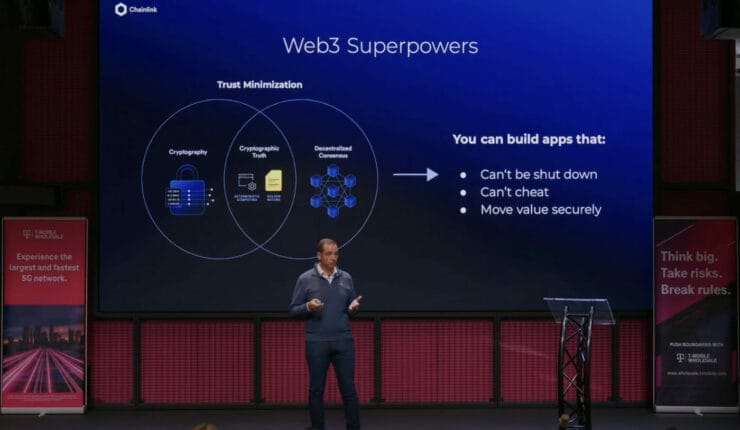During T-Mobile Wholesale and Innovation’s Web 3.0 Unleashed event at T-Mobile’s Innovation Center in Bellevue, WA, Chainlink Labs Chief Product Officer Kemal El Moujahid gave a fireside chat that distilled the magnitude of web3’s inevitable paradigm shift enabled by key Chainlink services.
“Web3 is about giving builders new superpowers,” he said.
With web3 technology, he explained, financial applications can prove their balance sheets to users in real time. Insurance smart contracts can guarantee automatic payouts without the need for adjusters or claims. Lotteries can verify winners are truly selected at random. Gaming ecosystems can be built with source code that makes it impossible for anyone to cheat or manipulate the rules.
“Those superpowers are unprecedented,” he said. “We’ve never seen this before.”
Having previously launched the Facebook Messenger platform – which 40 million businesses now use to reach more than a billion consumers – and scaled Google’s TensorFlow into the world’s top open-source machine learning platform, El Moujahid said the web3 paradigm shift is inevitable “because builders can build it and consumers will demand it.”
Having enabled more than $7 trillion in transaction value throughout the web3 economy, Chainlink expands the use cases for smart contracts by connecting blockchains to secure, reliable, decentralized off-chain “real-world” data and computation such as randomness and automation.
“We put these web3 superpowers in the hands of all builders,” El Moujahid said.
He highlighted the beta launch of Chainlink Functions, which allows smart contracts to make API calls to virtually any web2 service, as a critical step toward onboarding the world’s 30 million web2 developers.
“What we need to do is make it super-easy for them to build those value propositions so that consumers can see that it’s possible to consume those services, and then they demand it from the rest of the ecosystem,” he explained.
He encouraged developers to approach web3 as a spectrum. “Web3 is not a binary thing,” he said. While some applications will be web3-native, most businesses and developers will start from a web2 position and incorporate web3 strategies to differentiate their core offerings.
“Pick the thing that you think will create a differentiator and start with that,” he advised. “That’s the first thing.”
Watch Kemal El Moujahid’s full presentation at Web 3.0 Unleashed.


